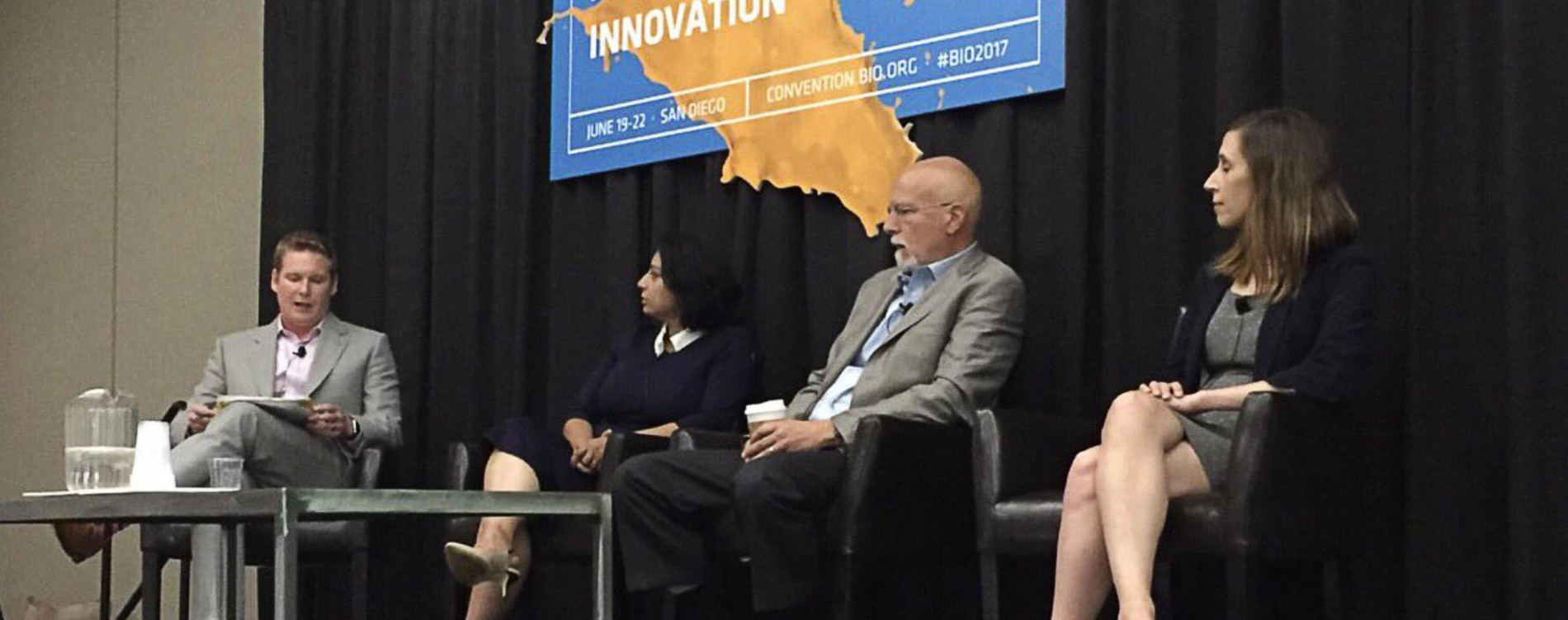Last week, I attended the BIO International Conference in San Diego with my colleague Andrew Koemeter-Cox. The convention is organized by the Biotechnology Innovation Organization (BIO), which is a group representing everyone involved in the global biotech industry. The convention gives us an opportunity to meet face-to-face with current partners and funded researchers, and forge new relationships. This year, three themes emerged in our discussions.
Policy Risks
While at the BIO Conference, I participated on the panel “Public Policy and the Coming Epidemic of Neurodegenerative Disease,” which was moderated by MacKay Jimeson of Pfizer’s Internal Medicine group. We discussed ongoing policy efforts to support Alzheimer’s and Parkinson’s disease patients, caregivers, and researchers.
Potential decreases in public funding for research coupled with recent clinical trial failures make the government’s stated goal of an effective treatment for Alzheimer’s by 2025 more difficult to reach. Nonprofits like the Alzheimer’s Drug Discovery Foundation (ADDF) are critical now because we represent another source of funding for drug research. As the only nonprofit solely focused on finding treatments for Alzheimer’s disease, the ADDF is poised to play an even more important role during this uncertain period.
Trial Recruitment
One of the major challenges in conducting clinical trials for Alzheimer’s disease is recruiting patients to volunteer. Alzheimer’s patients are elderly and often fully dependent on family members as caregivers. The stress of traveling back and forth from trial sites and undergoing extensive testing can be significant hurdles for many families, making it less likely they will participate in trials. This can result in very long recruitment periods, which then delay clinical trial results.
Daniel Skovronsky MD, PhD, Senior Vice President of Clinical and Product Development at Eli Lilly and Chairman at Avid Radiopharmaceuticals, got to the heart of this issue during a featured Fireside Chat. Dr. Skovronsky noted: “if you can cut the enrollment time . . . a drug can be available for market even sooner.” To reduce the time it takes to recruit patients, Lilly has started using alternative methods such as adaptive trial design and trial simulation.
The ADDF is funding two important resources—the Brain Health Registry and the Global Alzheimer’s Platform (GAP) Foundation—to accelerate clinical trial enrollment. As we invest in more clinical trials, we expect to support even more efforts to improve trial recruitment.
R&D Opportunities
During the panel, I was asked about the drug pipeline in Alzheimer’s disease and the recent failures of some anti-amyloid drugs. The ADDF discontinued funding for anti-amyloid drugs several years ago in favor of a “shots on goal” approach.
Alzheimer’s likely has multiple causes, so we fund drugs that target many of them, and will likely need combinations of therapies to effectively combat the disease. Dr. Skovronsky echoed our sentiments when he said: “we need to hit Alzheimer’s from multiple angles.”
In the last several years, attention has mainly been centered on clinical development for drugs targeting beta-amyloid and, occasionally tau. But there is growing interest from industry about the novel drug targets in our portfolio. To succeed, these novel drug programs will need additional partners to invest in their development, and it’s a positive sign that industry is showing interest.
In Closing
The panel ended with MacKay Jimeson posing this question to each of the panelists: Despite all the challenges we discussed, what gives you hope? What gives me hope is continuing to pursue innovative ways to attack this devastating disease with my colleagues at the ADDF, our funded scientists, and our partners. The pipeline of drugs being developed to treat Alzheimer’s is stronger and more diverse because of the work we do.
Lauren Friedman, PhD is Director, Scientific Affairs at the ADDF.
